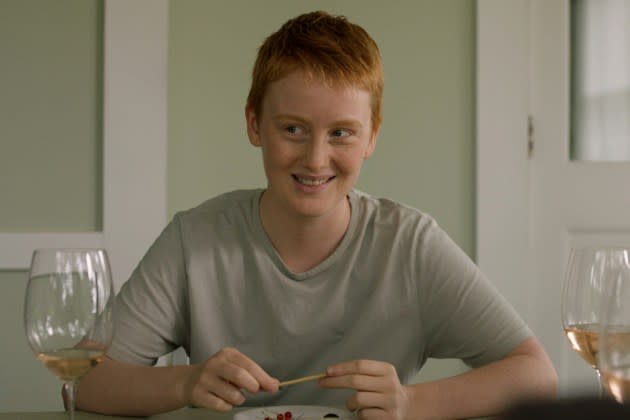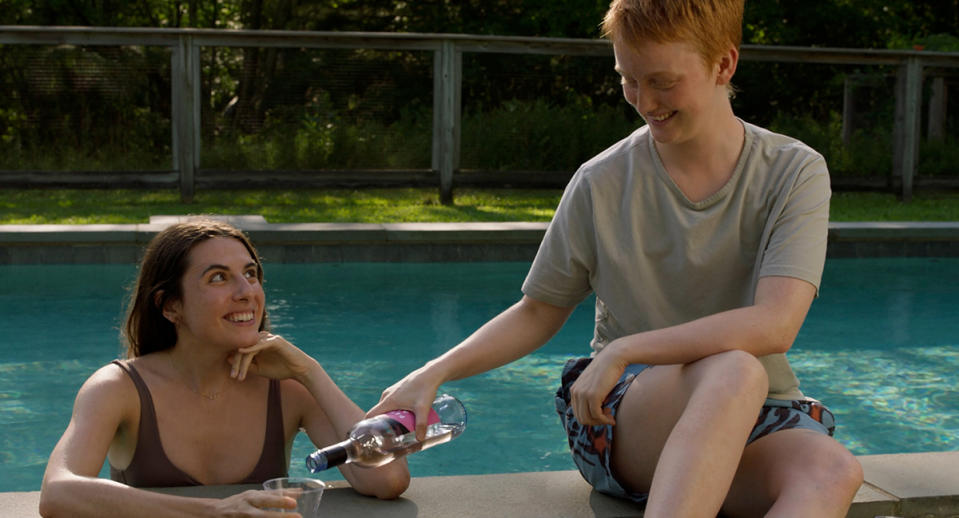Noah Schamus on How Their Debut Feature ‘Summer Solstice’ Captures Trans Intimacy by Mocking Bad Tropes and Embracing Bad Sex

The only thing more powerful than a first impression is a second one — at least, that’s the bet that “Summer Solstice,” a new anti-romantic comedy from Cartilage Films, makes on itself. Beginning with a character giving an impassioned monologue recounting his gender-affirming surgery, the speech quickly curdles into something pretty tacky, even including the line, “I went from a caterpillar to a butterfly.” But then another voice interrupts: “Okay, thanks. That’s enough.” This has all been in an audition room. And the audition is not going well.
“I had a family member come to a screening. And she said, ‘I was terrified in the first 30 seconds that this movie was going to be so awful,’” says writer-director Noah Schamus with a laugh.
More from Variety
The scene reorients to introduce Leo (Bobbi Salvör Menuez), a transgender man treading water in the ever-replenishing pool of auditioning New York actors. The performance drops and Leo returns to reality, as the interviewer asks a thoughtless question that further underlines the generic sentiments of the monologue: “The casting call is for a transgender male or transgender female. Just for our records, which one are you?”
“That was pulled from a couple of my friends who are actors who have had to answer that question while auditioning. Which is a bummer,” says Schamus, who identifies as trans-nonbinary and uses they/them pronouns. “So many roles iterate on certain tropes of transness on film. I wanted to get that out of the way. It felt like a nice way to bring audiences in who haven’t thought about those tropes before, but then be placed in the worst version of them. And then have them think, ‘Oh, I don’t know if I want to see this movie.’ You’re not going to.”
Now playing in New York and opening in Los Angeles on June 21, “Summer Solstice” follows Leo out of the audition room and on to a weekend vacation upstate with Eleanor (Marianne Rendón), a sunny cisgender college friend who runs at a much quicker tempo, almost inconsiderately so. The two haven’t met up since Leo’s transition and, though neither wants to directly address it, some unplaceable element of their dynamic has shifted.
“The script originated from this moment when I came out as non-binary. Some straight friends, who I had been ‘just one of the girls’ with — we had these confusing moments of not knowing how to relate to each other anymore. And so, there would be this weird flirtation that didn’t feel like an intimacy that we wanted,” Schamus says. “I wanted to explore when transition can make an intimacy feel stickier and less clear.”
The film marks Schamus’ debut narrative feature, but the director has already been embedded in the New York filmmaking scene. Their playful docufiction shorts reconsider how transness is represented onscreen, with the New Yorker-produced “The Script” reimagining baroque conversations about gender-affirming care with medical providers through a genre slant. “Summer Solstice” serves as a continuation of Schamus’ nonfiction projects, this time armed with an evident Eric Rohmer influence on its comedy, as characters breed their own isolation and flail for connection.

“I came out in dribs and drabs over a couple of years. During that period, I was making films, but I’m happy to say I’m a much better filmmaker than I was before I came out,” Schamus says. “I think I was trying to hide so much of myself from myself that my films were way less interesting, because I was just skimming the surface. … I don’t think I’ve figured out who I am necessarily, but knowing that’s a continuous process has enabled me.”
Leo and Eleanor find themselves learning the same lesson in “Summer Solstice,” attempting to sort out their tangled feelings for one another by — and spoilers follow — going about it the old-fashioned way. The bedroom hovers over the film as an inevitability for the two friends; after all, movies have a long history of resolving conflicts with sex. But there’s no climax to their weekend together, unless you count a screaming, thinly feigned one.
The consummation was where Schamus always wanted to lead these two characters, but the filmmaker first conceived of the moment — an act of break-up sex, of sorts — as a more punishing finale. As it plays, it’s a punchline, with the tension shattering between Leo and Eleanor and the chance for them to start fresh in their friendship.
“The first draft, their friendship was over. It was so depressing. They had this terrible sex that was completely unfunny,” Schamus says. “I want people to forgive each other. I want this film to be an acknowledgment that people change, but it doesn’t have to be that you hate each other and can never know each other ever again. That’s not a world that I want to live in.”
Best of Variety
Sign up for Variety’s Newsletter. For the latest news, follow us on Facebook, Twitter, and Instagram.


